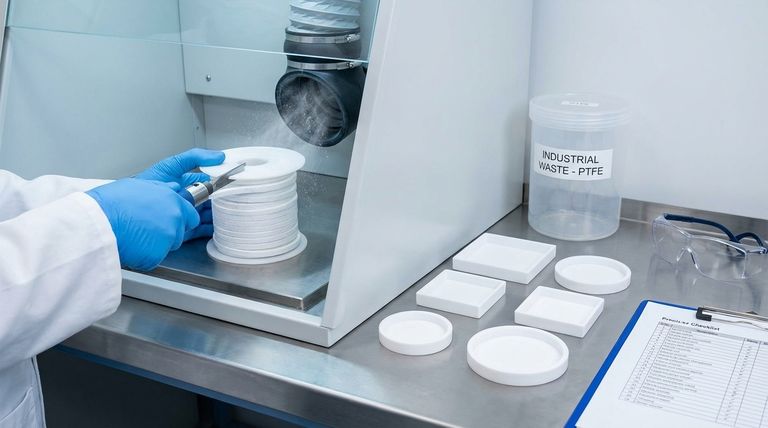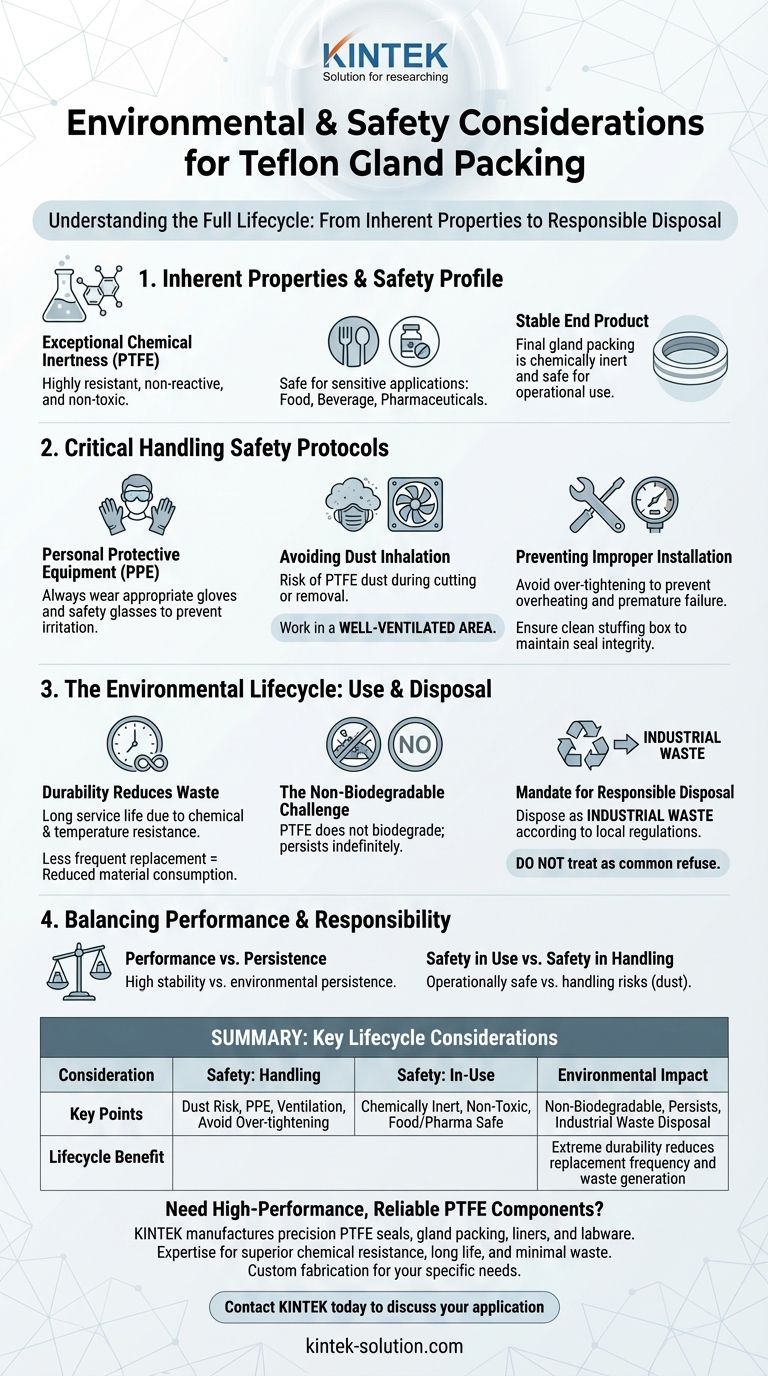When evaluating Teflon (PTFE) gland packing, the primary considerations center on its physical state. In its solid, installed form, PTFE is chemically inert and exceptionally safe for most applications, including food and pharmaceuticals. However, safety risks emerge from potential dust inhalation during cutting or removal, and its environmental impact stems from the fact that it does not biodegrade, mandating responsible disposal.
The core challenge with Teflon packing is not its operational safety, which is excellent, but managing the risks at the beginning and end of its lifecycle. Proper handling protocols mitigate worker exposure, while a clear disposal strategy addresses its environmental persistence.

Understanding Teflon's Inherent Properties
Teflon gland packing is prized for its unique material characteristics, which are the foundation of its safety profile and performance. Its effectiveness in demanding industrial environments is a direct result of its core composition.
Exceptional Chemical Inertness
The primary material, polytetrafluoroethylene (PTFE), is one of the most chemically resistant substances known. This inertness means it will not react with or contaminate the media it is sealing, making it a trusted choice for sensitive applications like food, beverage, and pharmaceutical processing.
The End Product vs. Manufacturing
While the manufacturing of PTFE involves precursor chemicals that require strict industrial controls, the final gland packing product is stable and non-toxic. The safety considerations for the end-user are focused on physical handling, not chemical reactivity.
Critical Safety Protocols for Handling
The safety of Teflon packing is contingent on proper procedures during installation and removal. The material is safe when static, but manipulating it can introduce risks that are easily managed.
Personal Protective Equipment (PPE)
Standard industrial safety practices are essential. Handling gland packing should always be done with appropriate gloves and safety glasses to prevent skin irritation and eye injury.
Avoiding Dust Inhalation
The most significant direct safety risk is the inhalation of PTFE dust. This can occur when cutting new rings to size or, more commonly, when removing old packing that has become worn or frayed.
Always perform these tasks in a well-ventilated area. Adhering to proper installation and maintenance schedules minimizes the degradation that creates loose particles.
The Danger of Improper Installation
Safety is also linked to performance. Over-tightening the gland follower is a common mistake that can cause the packing to overheat and fail prematurely.
This failure can lead to leaks of potentially hazardous process media. Similarly, failing to thoroughly clean the stuffing box before installation can compromise the seal and lead to failure.
The Environmental Lifecycle: Use and Disposal
The environmental impact of Teflon packing is defined by its remarkable durability. The very properties that make it valuable for industry also dictate its end-of-life considerations.
Durability Reduces Waste
Teflon packing's resistance to chemicals and extreme temperatures gives it a very long service life. This durability reduces the frequency of replacement, leading to less material consumption and equipment downtime over time.
The Non-Biodegradable Challenge
PTFE does not biodegrade. If sent to a landfill, it will persist in the environment indefinitely. This is the central environmental consideration for the material.
Mandate for Responsible Disposal
Because of its persistence, used Teflon packing must be disposed of as industrial waste according to local, state, and federal regulations. It should not be treated as common refuse.
Understanding the Trade-offs
Selecting any industrial material involves balancing its benefits against its drawbacks. With Teflon packing, the trade-offs are clear and manageable.
Performance vs. Persistence
The material's incredible chemical and thermal stability is the source of both its high performance and its environmental persistence. The choice to use it is a decision to prioritize operational reliability while committing to responsible end-of-life management.
Safety in Use vs. Safety in Handling
There is a distinct difference between the packing's state during operation and during maintenance. While it is extremely safe once installed, the hands-on tasks of cutting and removal introduce the primary hazard of dust exposure, requiring simple but strict safety protocols.
Making the Right Choice for Your Goal
Your operational priorities will determine where you focus your attention when implementing a Teflon gland packing strategy.
- If your primary focus is operational safety: Prioritize strict handling procedures, ensuring excellent ventilation and correct PPE use during installation and removal to mitigate dust exposure.
- If your primary focus is environmental compliance: Develop a clear end-of-life disposal plan that treats used packing as industrial waste in accordance with all relevant regulations.
- If your primary focus is long-term reliability: Emphasize correct installation techniques, especially avoiding over-tightening, to prevent premature seal failure and associated leaks.
By understanding and managing the full lifecycle of Teflon packing, you can leverage its superior performance safely and responsibly.
Summary Table:
| Consideration | Key Points |
|---|---|
| Safety: Handling | - Risk of PTFE dust inhalation during cutting/removal - Requires PPE and well-ventilated area - Avoid over-tightening to prevent failure |
| Safety: In-Use | - Chemically inert and non-toxic when installed - Safe for food, pharmaceutical, and sensitive applications |
| Environmental Impact | - PTFE is non-biodegradable and persists in the environment - Requires disposal as industrial waste per regulations |
| Lifecycle Benefit | - Extreme durability reduces replacement frequency and waste generation |
Need High-Performance, Reliable PTFE Components?
At KINTEK, we manufacture precision PTFE seals, gland packing, liners, and labware for the semiconductor, medical, laboratory, and industrial sectors. Our expertise ensures you get components that deliver superior chemical resistance and long service life, minimizing downtime and waste.
We provide custom fabrication from prototypes to high-volume orders, helping you meet both operational safety and environmental compliance goals.
Contact KINTEK today to discuss your specific application requirements and discover how our PTFE solutions can enhance your system's reliability and safety.
Visual Guide

Related Products
- Custom PTFE Parts Manufacturer for Teflon Containers and Components
- Custom PTFE Parts Manufacturer for Teflon Parts and PTFE Tweezers
- Custom PTFE Sleeves and Hollow Rods for Advanced Applications
- Custom PTFE Sealing Tapes for Industrial and High Tech Applications
- Custom PTFE Teflon Balls for Advanced Industrial Applications
People Also Ask
- What is PTFE used for in bearing bushings? To enable self-lubrication in extreme environments.
- What are the key advantages of Teflon in anti-corrosion materials? Achieve Unmatched Chemical Resilience
- How is surface preparation performed for PTFE coating application? Achieve Unbreakable Adhesion for Your Components
- What are the primary functions of PTFE expansion bellows? Absorb Movement, Dampen Vibration, and Protect Pipes
- What machining processes are used to create Teflon parts? Achieve Precision with Expert PTFE Machining
- How should one choose the right packing material? A Guide to Maximizing Seal Performance and Lifespan
- What long-term business benefits can PTFE diaphragm valves provide to pharmaceutical companies? Boost Yield & Cut Costs
- What are the key properties of virgin Teflon balls? Leverage Superior Chemical & Thermal Resistance



















